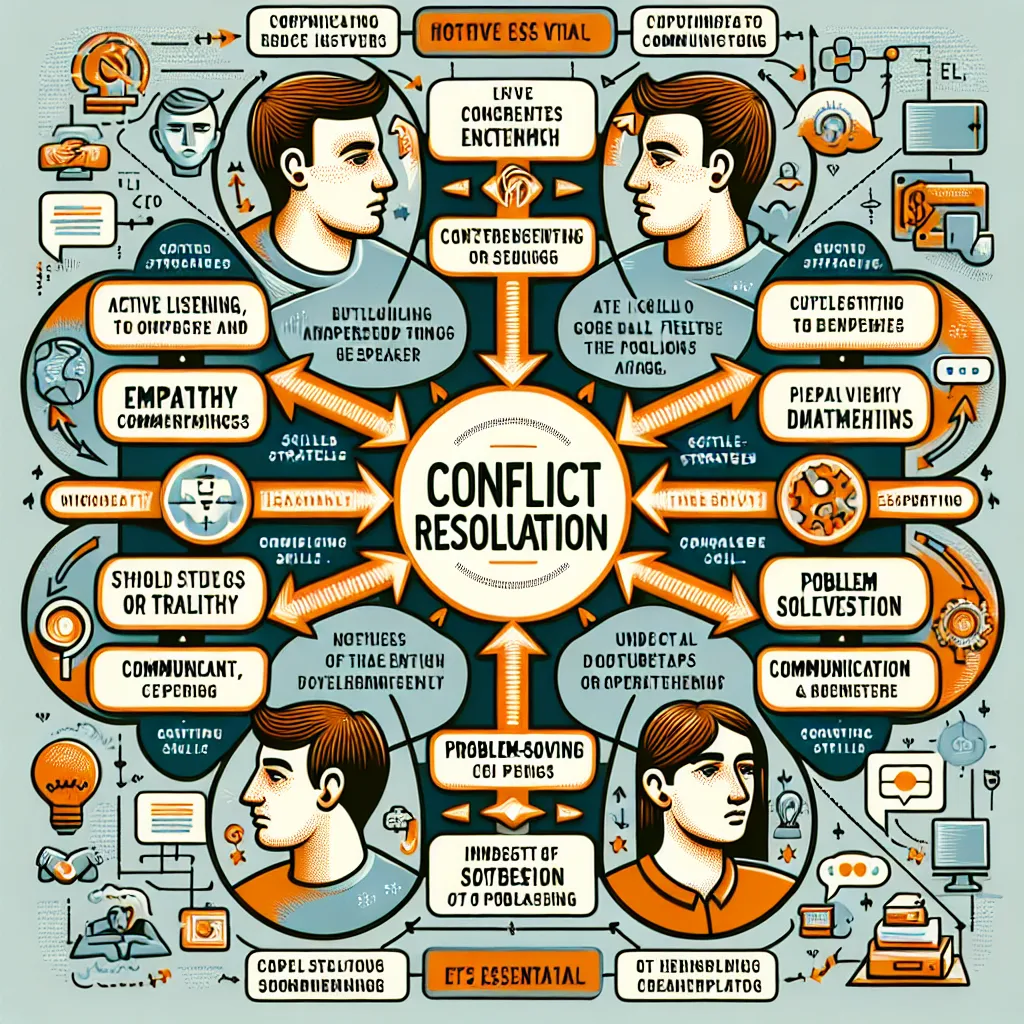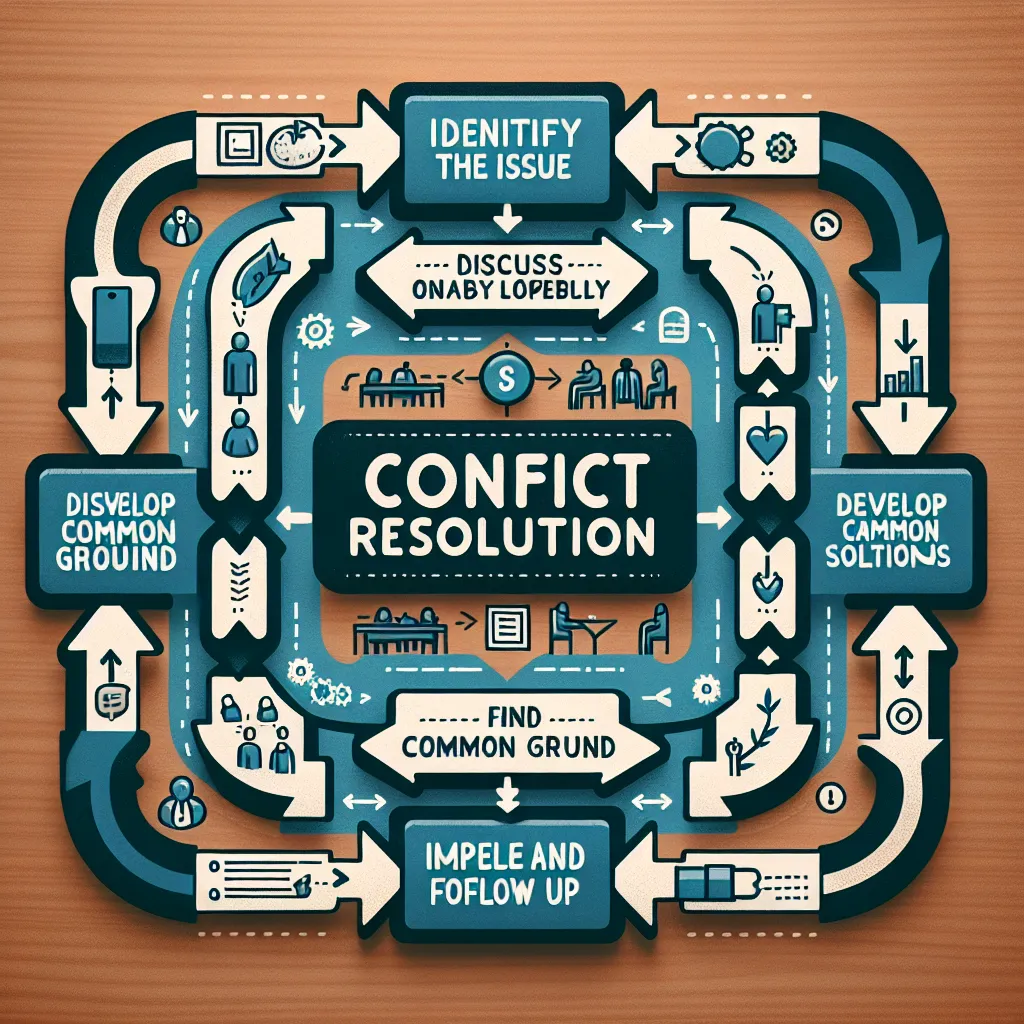In today’s competitive job market, mastering the art of answering interview questions is crucial for career success. One of the most challenging topics that often comes up during interviews is how to handle workplace conflicts. This guide will provide you with valuable insights and strategies to effectively address questions about conflict at work, helping you showcase your problem-solving skills and professionalism to potential employers.
Understanding the Importance of Conflict Resolution Skills
Conflict is an inevitable part of any workplace. Employers ask questions about conflict to assess your ability to handle challenging situations, work well with others, and contribute to a positive work environment. Your responses to these questions can reveal a lot about your interpersonal skills, emotional intelligence, and overall fit for the role.
 Conflict Resolution Skills Diagram
Conflict Resolution Skills Diagram
How Employers Evaluate Responses to Conflict Questions
When asking about conflict, interviewers are looking for several key qualities:
- Self-awareness: Can you recognize your role in conflicts?
- Communication skills: How well do you express yourself in difficult situations?
- Problem-solving abilities: Can you find constructive solutions to disagreements?
- Professionalism: Do you maintain composure and respect for others during conflicts?
- Adaptability: Are you willing to compromise and find middle ground?
Common Interview Questions About Conflict and Sample Answers
Let’s explore some typical questions about workplace conflict and how to answer them effectively.
1. “Tell me about a time when you had a conflict with a coworker. How did you handle it?”
Sample Answer: “In my previous role as a project manager, I had a disagreement with a team member about project priorities. I scheduled a private meeting with them to discuss the issue calmly. I practiced active listening to understand their perspective fully. We then collaborated to create a compromise that addressed both of our concerns. This experience taught me the value of open communication and finding win-win solutions.”
2. “How do you deal with difficult colleagues?”
Sample Answer: “When dealing with difficult colleagues, I focus on maintaining professionalism and finding common ground. I try to understand their perspective and motivations. If needed, I’ll have a private conversation to address any issues directly but respectfully. I also believe in setting clear boundaries and expectations to prevent future conflicts.”
3. “Describe a situation where you had to work with someone you didn’t get along with.”
Sample Answer: “In a previous job, I was paired with a colleague on a long-term project despite our different working styles. Instead of letting our differences hinder progress, I suggested we have an open discussion about our strengths and preferences. We created a work plan that capitalized on our individual strengths and established clear communication channels. By the end of the project, we had developed a mutual respect and even friendship.”
4. “How do you handle disagreements with your supervisor?”
Sample Answer: “When I disagree with a supervisor, I first ensure I fully understand their perspective. I then prepare my thoughts and any supporting data before requesting a private meeting. During the discussion, I present my viewpoint respectfully, focusing on the goals of the project or organization. I’m always open to feedback and willing to find a middle ground that aligns with the company’s objectives.”
5. “Can you give an example of how you’ve turned a conflict into a positive situation?”
Sample Answer: “In my role as a customer service representative, I once had a heated disagreement with a colleague about how to handle a particularly difficult customer complaint. Instead of letting the conflict escalate, I suggested we use this as an opportunity to review and improve our customer service protocols. We worked together to create a more comprehensive guideline for handling complex complaints, which was later adopted company-wide. This experience not only resolved our immediate conflict but also led to improved customer satisfaction scores.”
Tips for Answering Questions Outside Your Experience
If you’re asked about a conflict situation you haven’t personally experienced, consider these strategies:
- Use a hypothetical scenario: “While I haven’t encountered that specific situation, if I were to face such a conflict, I would…”
- Draw from related experiences: “Although I haven’t had that exact experience, I can share a similar situation where I used conflict resolution skills…”
- Focus on your conflict resolution approach: “In any conflict situation, my approach would be to…”
Common Mistakes to Avoid When Answering Conflict Questions
When discussing workplace conflicts, be careful to avoid these pitfalls:
- Blaming others: Always take responsibility for your part in the conflict.
- Speaking negatively about former colleagues or employers: Maintain professionalism and focus on the resolution, not the drama.
- Claiming you never experience conflicts: This can seem unrealistic or indicate a lack of self-awareness.
- Providing vague answers: Use specific examples and outcomes to demonstrate your conflict resolution skills.
- Showing an unwillingness to compromise: Employers value team players who can find middle ground.
 Conflict Resolution Process Flowchart
Conflict Resolution Process Flowchart
Follow-up Questions and Suggested Responses
Interviewers may ask additional questions to delve deeper into your conflict resolution skills. Here are some potential follow-ups with suggested responses:
-
Q: “What do you think is the most important factor in resolving workplace conflicts?”
A: “I believe effective communication is key. Being able to listen actively, express thoughts clearly, and remain open to different perspectives can prevent misunderstandings and lead to quicker resolutions.” -
Q: “How do you handle conflicts that arise from cultural differences?”
A: “I approach such situations with cultural sensitivity and an open mind. I take time to learn about different cultural perspectives and practices, and I’m always willing to have respectful discussions to find common ground and mutual understanding.” -
Q: “Can you describe a time when you had to mediate a conflict between team members?”
A: “As a team lead, I once mediated a dispute between two colleagues with different working styles. I organized a meeting where each person could express their concerns without interruption. Then, we collaboratively developed a plan that accommodated both their needs while meeting project goals.” -
Q: “How do you manage conflicts that arise from competing priorities?”
A: “I find that conflicts often arise from misaligned priorities. In such cases, I focus on clarifying the overall objectives and then work with all parties to create a prioritized task list that balances different needs while keeping the main goals in focus.” -
Q: “What strategies do you use to prevent conflicts from escalating?”
A: “To prevent conflicts from escalating, I believe in addressing issues early and directly. I practice active listening, use ‘I’ statements to express my feelings without blame, and always aim to find mutually beneficial solutions. Regular check-ins and open communication channels also help nip potential conflicts in the bud.”
By preparing thoughtful responses to these questions, you’ll demonstrate your ability to handle workplace conflicts professionally and effectively. Remember, the key is to show that you can turn challenging situations into opportunities for growth and improved teamwork.
For more interview preparation tips, check out our guides on how to answer questions about leadership philosophy and how to answer questions about collaboration skills.
Conclusion
Answering questions about conflict at work can be challenging, but with the right approach, you can turn these questions into opportunities to showcase your interpersonal skills and problem-solving abilities. Remember to focus on positive outcomes, demonstrate your capacity for self-reflection, and highlight your commitment to professional growth and teamwork.
By following the strategies outlined in this guide, you’ll be well-prepared to tackle conflict-related questions in your next interview. Practice your responses, stay calm, and approach each question as a chance to demonstrate your value as a potential employee.
Don’t forget to check out our other resources on how to answer behavioral interview questions and how to answer questions about managing priorities to further enhance your interview skills. Good luck with your job search!




